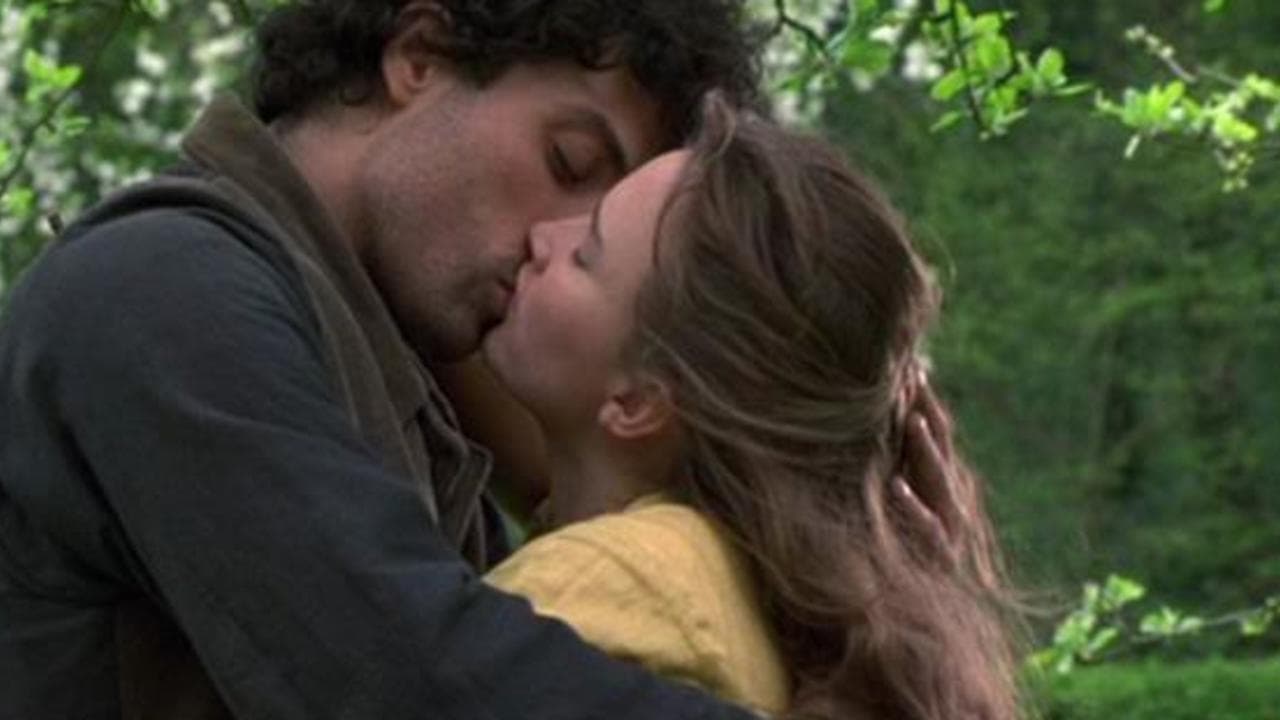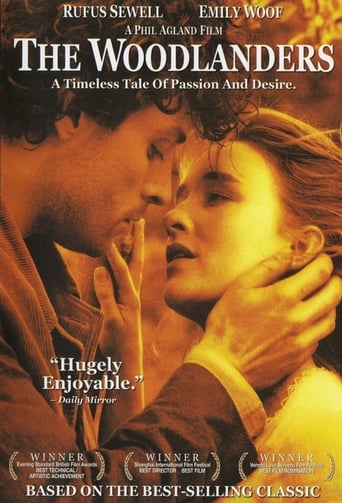

This is a tender, generous movie that likes its characters and presents them as real people, full of flaws and strengths.
... View MoreOne of the worst ways to make a cult movie is to set out to make a cult movie.
... View MoreThere is, somehow, an interesting story here, as well as some good acting. There are also some good scenes
... View MoreThe film never slows down or bores, plunging from one harrowing sequence to the next.
... View MoreDespite his prominent position in the canon of English literature, Thomas Hardy has never really been a mainstay of the cinema in the way that, say, Dickens or (at least in recent years) Jane Austen have been. Although there have been occasional excellent Hardy adaptations, such as Schlesinger's "Far from the Madding Crowd" or Polanski's "Tess", a number of his novels have never been the subject of a feature film. There were, however, television adaptations of two of his novels in the mid-nineties, "The Return of the Native" in 1994 and "The Woodlanders" three years later. I deliberately watched the two films over the same weekend for the purposes of comparison. The two novels have basically similar plots, both being organised around a "love pentagon" along the lines of "A loves B, who loves C, who loves D, who loves E", although in "The Return of the Native" things are complicated by the fact that D (Eustacia) still has feelings for C (Wildeve) despite her marriage to E (Clym). In "The Return" the pentagon involves three men and two women; in "The Woodlanders" it is the other way round. A is Marty South, a young peasant girl who is in love with the woodsman Giles Winterborne (B), but he is in love with his childhood sweetheart, Grace Melbury (C). Grace, however, rejects Giles's proposal of marriage under pressure from her nouveau-riche father, who regards him as being not good enough for his daughter. She eventually marries the well-born young doctor Edred Fitzpiers (D), but the marriage is not a happy one and he begins an affair with a rich widow named Mrs. Charmond (E). Hardy regarded "The Woodlanders" as one of his best novels, and many contemporary reviewers agreed with that assessment, but twentieth and twenty-first century critics have not always followed suit. Certainly, as a film this version is not anywhere near as good as "The Return of the Native" which contained some excellent acting performances, especially from the young, pre-stardom Catherine Zeta Jones. The main weakness is the casting of Rufus Sewell as Giles. Giles Winterborne is reminiscent of some of Hardy's other characters, notably Gabriel Oak in "Far from the Madding Crowd" and Diggory Venn in "The Return of the Native". All three are plain and simple countrymen, decent and uncomplaining, who patiently and faithfully continue to love a woman despite an initial rejection. The difference is that Giles is the tragic hero of "The Woodlanders", whereas Gabriel and Diggory are eventually rewarded for their patience. (In those two novels the full force of the tragedy falls upon others). Sewell, however, seems to mistake Giles's patient stoicism for stolidity and lack of emotion, and plays him throughout as a dull, unresponsive fellow, wearing virtually the same expression, one of hangdog resignation, in every scene. I was surprised to see him smile briefly at one point, but presumably he needed to keep a second expression in reserve, just in case the first one should get worn out through overuse. None of the other acting contributions stand out, and Emily Woof makes a bland and forgettable Grace. The most memorable thing about her is her odd surname; I had to see it in print several times before the penny finally dropped and I realised that she was not called "Emily Woolf". (Just as it took me a long time to realise that Uma Thurman really was called "Uma" and not "Una"). As with most British "heritage cinema" productions the costumes and period detail are well done, and the woodland scenery is attractive, but this is far from being the best historical drama of recent years. 6/10
... View MoreDon't go in expecting a great deal of fun, romance or a happy ever after, as this is quintessential Thomas Hardy: dour, gloomy and glum. One of the best elements of THE WOODLANDERS is the setting: it takes place in a wooded village in a rural little corner of England, sometime in the 19th century. Such locales are bound to have plenty of atmosphere, and THE WOODLANDERS possesses it in spades. It's just a shame the story is so unappealing and determined to be depressing.Rufus Sewell, in an early role, brings warmth and life to the film as humble woodsman Giles. He's in love with Emily Woof, who ends up betrothed to another man entirely (local doctor Cal Macaninch). Fleshing out the cast are Tony Haygarth (extremely typecast as a gruff but lovable type, but so good at it) and ROME's Polly Walker, vamping it up as the sinister Mrs Charmond.This adaptation is well shot and, dare I say it, authentic. The main problem is that the cold characters are so hard to like, and that even includes heroine Emily Woof, who doesn't seem to see what's right under her nose. The only appealing character of the bunch is Sewell and he gets only a little screen time. Yes, this production is moving in places and the themes are engaging, so it's not all bad, but I would have preferred something with a little more drama and oomph.
... View MoreGiles (Rufus Sewell) is the right-hand man to a successful, rural logger. A handsome gent, he and the business owner's daughter, Grace (Emily Woof) grew up together and became very attached. But, the logger always had a chip on his shoulder that he was not refined so he sent his only child to a finishing school for some years. Now, Grace is coming home and Giles is eager to re-establish a relationship with her. But, alas, the beautiful young lady, although quite kind, is hoping to make a better match, having her head filled with bookish nonsense. This stuns Giles but, he keeps on keeping on. Even when he loses his home to a local woman's pettiness, the handsome man stays true to Gracie and his community. As bad luck would have it, there is a new doctor in town and once Gracie meets him, she sets her sights on him and the interest is mutual, resulting in marriage. How can this be, when clearly the doctor is a somewhat pompous and flawed individual and Giles is such a handsome, true-to-you kind of male? This is a complicated tale from the great writer, Thomas Hardy, of 19th century England. Hardy excelled in penning books about ordinary, country folks who sometimes had terrible exchanges with the wealthier, more powerful classes. Tragedy was often the result and the story here is much of the same. Admirably, this film is never melodramatic or forced but tells the complicated story very well. Also, the cast is quite wonderful, all of them, even though Sewell or Polly Walker are the only known actors. Then, too, the setting in the English countryside is very lovely and authentic, showing the beauty and the rustic nature of the existence in another time, another place. Costumes, too, are sensational, the productions values are very fine, and the script and direction are most competent. If you adore the classics, romance, or historical tales, you would do well to search for the Woodlanders. It is a powerful story that would spark a most animated discussion, even as it entertains.
... View MoreTypical British drama based on a novel by Thomas Hardy, the author of "Jude the Obscure", "Tess of the d'Urbevilles" and "Far from the Madding Crowd". As usual in Hardy's stories, it is set on British countryside and focuses on the ordinary lives of its local people. As usual in this kind of movie, it is really well-made and extremely well-acted, but also bureaucratically directed.Hardy's characters are quite human, they are always looking for happiness in the wrong places, making bad choices, missing the best opportunities. Here is not different. Marty loves Giles who loves Grace who loves him no more. She is unsure about her feelings since she returned from a period of studies in the town. The small village where she grew up doesn't look much attractive now, neither Giles does. She dreams about going abroad with Mrs. Charmond, the rich landowner widow, while she flirts with the newcomer young doctor - he also came from the town. Soon all of them will be facing the unavoidable fate.The woodworker Giles (Rufus Sewell) reminds me the shepherd Gabriel from "Far from the Madding Crowd": both are honest, hard-working, heartbroken men. Emily Woof is just perfect as Grace; she looks like Cate Blanchett and she can even play like her. Unfortunately Jodhi May has just a small role as Marty the poor girl who sells her beautiful long hair to survive, a very sympathetic character. Tony Haygarth is also excellent as Grace's father, a well-intentioned man who wishes only the best for his daughter, but practically manipulates her life. I usually see Haygarth playing weird roles, like Renfield in "Dracula" (1979) or the Mad Hatter from Alice's Wonderland in "Dreamchild", so it is refreshing to see him playing normal types. Good film, good story, but not recommended for people looking for something light.
... View More